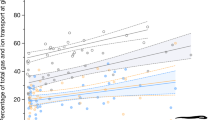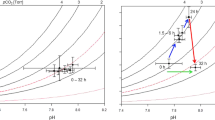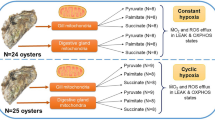Abstract
OXYGEN affinity of haemoglobin inside red blood cells is decreased to a level where oxygen unloading can proceed at sufficiently high partial pressures in the tissue capillaries. This adaptation of oxygen affinity is accomplished mainly by the interaction of haemoglobin with intraerythrocytic phosphates1. These comprise 2,3-diphosphoglycerate (DPG) in most mammals, ATP and GTP in fish2, and myo-inositol pentaphosphate (IP5) in mature birds3–5. No haemoglobin system has been described in higher vertebrates which is devoid of functional interaction with the respective intracellular phosphates. Recently, however, Sullivan6 has questioned the role of phosphates for the control of oxygen affinity in crocodilered cells (ATP and inorganic phosphate have been identified3,7,8). He remarks that “the substance regulating oxygen affinity in alligators is very efficient, but unknown”. We show here that the oxygen affinity of haemoglobin from a member of the order crocodiles (Crocodylus porosus) is not affected by any of the regulating allosteric cofactors known with the exception of molecular CO2 and protons.
This is a preview of subscription content, access via your institution
Access options
Subscribe to this journal
Receive 51 print issues and online access
$199.00 per year
only $3.90 per issue
Buy this article
- Purchase on Springer Link
- Instant access to full article PDF
Prices may be subject to local taxes which are calculated during checkout
Similar content being viewed by others
References
Benesch, R. E. & Benesch, R. Adv. Prot. Chem. 28, 211–237 (1974).
Weber, R. E., Lykkeboe, G. & Johansen, K. J. exp. Biol. 64 75–88 (1976).
Rapoport, S. & Guest, G. J. biol. Chem. 138, 269–282 (1941).
Johnson, L. F. & Tate, M. E. Can. J. Biochem. 47, 63–73 (1969).
Isaaks, R. E. et al. Comp. Biochem. Physiol. 55A, 29–33 (1976).
Sullivan, B. in Chemical Zoology 9, (eds Florkin, M. & Scheer, B. T.) 377–398 (Academic, New York, 1974).
Bartlett, G. R. Comp. Biochem. Physiol. 55A, 211–214 (1976).
Coates, M. J. mol. Evol. 6, 285–307 (1975).
Bauer, C., Baumann, R., Engels, U. & Pacyna, B. J. biol. Chem. 250, 2173–2176 (1975).
Bergmeyer, H. U. (ed.) Enzymatische Methoden 2 (Verlag Chemie, Weinheim, 1974).
Bartlett, G. R. & Borgese, T. A. Comp. Biochem. Physiol. 55A, 207–210 (1976).
Hill, A. V. J. Physiol., Lond. 40, 4–7 (1910).
Sullivan, B. & Riggs, A. Biochim. biophys. Acta 140, 274–283 (1967).
Bauer, C. & Kurtz, A. J. biol. Chem. 252, 2952–2955 (1977).
Morrow, J. S., Matthew, J. B., Wittebort, R. T. & Gurd, F. R. J. biol. Chem. 251, 477–484 (1976).
Giardana, B., Ascoli, F. & Brunori, M. Nature 256, 761–762 (1975).
Bauer, C. Engels, U. & Paleus, S. Nature 256, 66–68 (1975).
Author information
Authors and Affiliations
Rights and permissions
About this article
Cite this article
BAUER, C., JELKMANN, W. Carbon dioxide governs the oxygen affinity of crocodile blood. Nature 269, 825–827 (1977). https://doi.org/10.1038/269825a0
Received:
Accepted:
Issue Date:
DOI: https://doi.org/10.1038/269825a0
This article is cited by
-
Purification, Characterization, and Crystallization of Crocodylus siamensis Hemoglobin
The Protein Journal (2014)
-
Respiratory properties of blood in flatback turtles (Natator depressus)
Journal of Comparative Physiology B (2007)
-
Transplanting a unique allosteric effect from crocodile into human haemoglobin
Nature (1995)
-
Gas exchange strategy in the Nile crocodile: a morphometric study
Journal of Comparative Physiology B (1990)
-
Crystallographic analysis of mutant human haemoglobins made in Escherichia coli
Nature (1986)
Comments
By submitting a comment you agree to abide by our Terms and Community Guidelines. If you find something abusive or that does not comply with our terms or guidelines please flag it as inappropriate.



